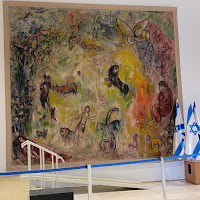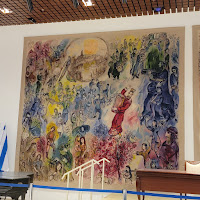It is the day before Yom Kippur - the holiest day of the Jewish Calendar. Okay there is an argument about that - it may well be that Shabbat - every Saturday - is actually considered the holiest day - but let's put that aside for a bit. If you have never been to Israel on Yom Kippur - it is really an amazing experience. All traffic ceases to a halt - other than an handful of emergency and security vehicles. Even secular Israelis refrain from using their cars. There is no "law" that bans cars - but I guess the collective society has decided that everyone is willing to agree to make the day special.
Non observant Israelis have turned Yom Kippur into a national biking holiday. People who are not going to synagogue - get on their bikes - by themselves or with friends and family. Some take cross country routes - using highways that are normally filled with cars but are now filled only with bicycles. Some use the opportunity to teach their children to ride bikes - since there are so many "safe" places to do that on this day. Others use skateboards, roller blades or even electric bikes - and some just walk or jog.
So far, we have stayed on the sidelines from this alternate Yom Kippur celebration - since we tend to observe the day in more traditional fashion. It would actually be quite amazing to be able to do both - have one day a year with no cars just for biking and walking - without that day falling on Yom Kippur. But I guess life is always filled with choices.
Instead, as you might know, we join our friends and Synagogue community in running Yom Kippur prayer services - tefillot. For the past 10-15 years, we have been running a satellite service in Ra'anana - since our main synagogue is in K'far Saba - about 7 km away. We either hold it in an available synagogue in Ra'anana (some synagogues rent out gyms or halls for Yom Kippur since there are too many people for their synagogue) or we use someone's house or backyard. We have hosted once but fortunately we have found another venue at a lucky friend's house. I have been conducting the Neilah service for somewhere in the range of 10 years. That is the last service of Yom Kippur which runs for about the last hour and half of the fast (no food no water for 26 hours) - and everyone is standing for most of it - while I get to sing prayers for most of that time....hopefully with everyone joining in.
About three or four years ago, we added the Kol Nidrei service - before that - everyone in our group was attending at other synagogues or walking to our shul in K'far Saba. I agreed to take that on - so that is another 2 hours or so of singing at the start of the fast. On top of that, we have a full service in the morning - though we abbreviate it a bit. Lots of work to do there to share the Torah reading etc., All in all, it is quite a bit of preparation, quite an investment of time - but quite rewarding. Hopefully it is spiritually rewarding for those attending.
So really - I should probably be preparing some more now - "cramming" rather than taking the time to write this blog. Or cooking for the pre-fast meal....Or cooking for the break-fast meal....or resting. Well. Much of the cooking is done. And I think I'm fairly ready since I have done this more than a few times. But it always helps to review.
As I am writing - tens of thousands of people are at the Kotel in Jerusalem, attending at the annual last minute selichot ("forgiveness") prayers. People come from all over the country to sing and pray late into the night. Since driving is permitted - people are able to attend selichot from anywhere in the country whereas during Yom Kippur itself, people can only get to the Kotel if they can walk there. Or bike, I suppose....
There are some people who manage the blend the two. Perhaps they bike all day on Yom Kippur and then find some Neilah service to attend where they can hear the final shofar blown marking the end of Yom Kippur. Even at our small service, we probably wind up with double the normal number right near the end. We were once at a synagogue in Mazkeret Batya (a small town near Rehovot) for the Neilah service. As the end of Yom Kippur drew near, the synagogue filled up so completely it was standing room only. In fact, people were looking in to the synagogue from windows surrounding the building and at the door entrance. It was like everyone in the town showed up - secular and religious for the last 15-20 minutes of Yom Kippur. All waiting for the sound of final shofar note.
Election Update
As you might also know, Israel's next election is only one month away. It will be held on November 2, 2022. This blog would be too long if I reviewed all of the political parties and their chances so I will do that in another blog - closer to the actual election. But I do have a few short comments.
First of all, there is a reasonable chance that this 2022 election will end up in a stalemate. Former Prime Minister Netanyahu and his Likud party are polling at anywhere from 30-35 seats. No Israeli party ever manages to get a majority government by itself - with 61 seats required to form a government in the 120 seat Knesset. Netanyahu is counting on the support of two ultra-religious parties - Shas (Ultra-religious Sephardic party) and Yehadut HaTorah (Torah Judaism) - which are likely to get about 14 seats combined. He is also counting on support from an ultra-right party - the Religious Zionist party, led by Betzalel Smotrich and Itamar Ben Gvir. These are some pretty scary folks - who would like to turn Israel into a state run according to Jewish religious law - and have little appreciation for democracy. But for some reason, they are polling at somewhere in the range of 10-13 seats, which is shockingly high. So if you add all of that up - there is a scenario where these four parties could combine and get past 61 and form a government. It would be Israel's most right wing government ever, heavily weighted with religious extremists. It would also be a government that would be likely to help Netanyahu get out of his legal troubles even though he is in the middle of a criminal trial.
 |
| The Israeli Knesset |
So unless the numbers change dramatically between now and November 2, 2022, Israel is likely to wind up with either a stalemate and another election or a right wing government, led by Bibi. That being said - a month is a long time. Numbers could change quite a bit. Buckle up. It should be interesting.
Sports News
The Israel under 21 soccer team has qualified for the European Championships - which is very exciting for Israelis since soccer is the most popular sport here. Unfortunately, the senior team didn't qualify for the World Cup, which starts in November in Qatar. It is simply too difficult for Israel to qualify. Instead of having to play teams from its region, the Middle East, Israel is stuck in the European division, which makes it much harder to qualify. This is due to Israel's lack of peaceful relations with many of the surrounding countries - or to put it another way - the refusal of those countries to recognize Israel's right to exist. Maybe the day is getting closer when Israel will have to play Egypt, Jordan, Saudi Arabia, Iran and Iraq to qualify. But for now, we still have to get past France, Portugal, Germany and others, which is much more difficult.
Meanwhile, with my relative lack of interest in watching soccer, I have preferred to jump on the bandwagon and watch our home town Blue Jays - having one of their best seasons ever. Playoffs start this week - which means watching games that start at 2 a.m. here in Israel. I'm hoping to be back in Toronto for some really meaningful Blue Jay playoff games.
I'm also quite excited about the Buffalo Bills - the closest thing Toronto has to an NFL home town team. I have been to many games in Buffalo. While they have had some fantastic seasons, inlcuding four losing Super Bowl appearances in a row - the 2022-23 edition of the Bills may be their best team ever. That also means watching at some crazy hours when I'm in Israel - though if they play a 1 p.m. game - that is a very manageable 8 p.m. start here in Israel.
I am going to wrap this up for now and wish everyone who is observing a Gmar Hatima Tova - may you have a meaningful fast - and be inscribed in the good books of life and everything positive for the coming New Year. I hope to write some more soon - likely with a bit more political analysis.






